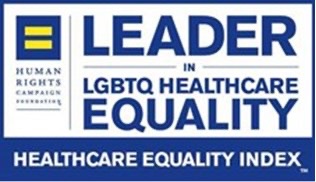Poised for Pride: Strong Earns Healthcare Equality Designation
Poised for Pride: Strong Earns Healthcare Equality Designation
Strong Memorial Hospital has again been named one of the nation’s leaders in LGBTQ+ inclusion and equality initiatives by the Human Rights Campaign Foundation (HRC). The Healthcare Equality Index (HEI) surveys health care facilities on policies and practices dedicated to the equitable treatment and inclusion of LGBTQ+ patients, visitors and employees.
 Strong earned the LGBTQ+ Healthcare Equality Leader designation using survey criteria that include non-discrimination and staff training, patient services and support, employee benefits and policies, and patient and community engagement. Under HRC’s system, a facility needs to score 100 points to be designated an “LGBTQ+ Healthcare Equality Leader.” Facilities receive points for meeting specific requirements and by having a certain number of best practices and policies in place.
Strong earned the LGBTQ+ Healthcare Equality Leader designation using survey criteria that include non-discrimination and staff training, patient services and support, employee benefits and policies, and patient and community engagement. Under HRC’s system, a facility needs to score 100 points to be designated an “LGBTQ+ Healthcare Equality Leader.” Facilities receive points for meeting specific requirements and by having a certain number of best practices and policies in place.
In the HRC survey, Strong was recognized—as in past years—for meeting criteria such as having a patient non-discrimination policy that includes the terms “sexual orientation” and “gender identity,” providing equal visitation rights to LGBTQ+ patients and their loved ones, having an employment non-discrimination policy that is fully LGBTQ+ inclusive, and providing approved training in LGBTQ+ patient-centered care.
Everyone under the University of Rochester umbrella shares the responsibility of bolstering acts of inclusion and equity to protect the LGBTQ+ community and align with organizational values.
Jackie Beckerman, chief patient experience officer and senior director of the ICARE Commitment, recognizes just how critical it is to break down health care barriers for the LGBTQ+ community.
“Our goal, first and foremost, is to ensure that all patients receive high quality, compassionate, and equitable care—in an environment that feels respectful and safe for everyone,” she said. “Our LGBTQ+ patients face significant challenges in health care, and we need to provide a space where these individuals always feel safe and comfortable talking with their care team about all aspects of their lives. There is no place for discrimination or bias in this organization.”
Mark Taubman, M.D., URMC CEO and SMD dean, said being a model institution for equity is a crucial goal for the Medical Center. “As use of pronouns has taken hold, just by saying them you are demonstrating that you are sensitive to the issues of gender identity,” he said.
Taubman recognizes that earning an award or recognition—a designation in this case —doesn’t mean the job is done.
“There’s always more to do,” said Taubman. “We acknowledge the award as it tells us where the bar is. Our goal is not to hit the bar but be way above it. There are so many ways to make equity and inclusiveness attainable.”
Members of the LGBTQ+ community are often subject to discrimination in all spaces, including health care facilities.
“This often leads to avoiding care and anticipating their voices not being respected in an incredibly vulnerable environment,” said Tari Hanneman, director of Health & Aging at The Human Rights Campaign. “The Healthcare Equality Index, at its core, strives to ensure LGBTQ+ people are protected and affirmed by their health care providers and feel safe seeking services.”
This designation, awarded at the end of March, ties in with Pride Month, celebrated throughout the nation during June. The Medical Center has made progress in the treatment of LGBTQ+ individuals and is committed to continuing to work to protect those who have been marginalized.
“There are so many people who need love and support and help right now,” said Timothy Wood, a UR Medicine patient and member of the transgender community, who said the University works to understand his needs. “Trusting in your health care system is key. I’m so grateful for the support I receive from my primary care doctor.”
More than two decades ago, Wood began living secretly as a man, unable to reveal his true self to many of his friends and family members. He described years of feeling alienated and lonely.
It’s patients like Wood, along with a diverse staff and faculty, that the Medical Center aims to protect. Being inclusive means that everyone who identifies as LGBTQ+ has a safe place.
“Our society is very binary, but we don’t have to all fit in neatly, we’re not under obligation to be a certain way,” said Wood. “It’s about respecting people’s differences and lifestyles without making a big deal of it or overreacting.”